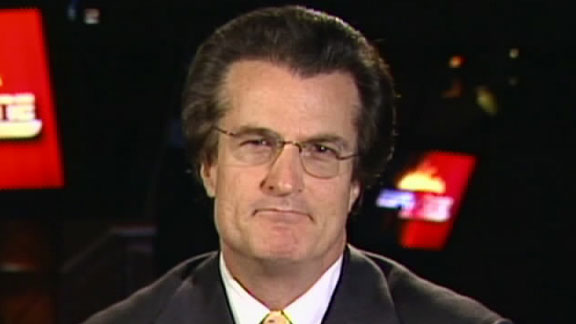Thankfully, the 2025 NFL draft is now over. The big story was quarterback prospect Shedeur Sanders. Though projected by many as a top ten pick, he fell to the fifth round. He was the 144th overall pick, a full three days into the draft.
Once again, many of the predictions of longtime ESPN analyst Mel Kiper Jr. were embarrassingly wrong. Kiper viewed Sanders as the top quarterback in the draft and even compared him to NFL legend Drew Brees. Kiper was confident the Colorado quarterback would be selected as the ninth pick, at the very least.
When things didn’t go his way, Kiper became visibly irritated, saying he was “disgusted” the NFL teams had rejected his high praise of Sanders. Although Kiper wasn’t the only one to get this wrong, he was one of the most visible.
This is about more than football, so please stay with me.
The Shedeur Sanders outcome prompted me to do a little research into Mel Kiper Jr’s predictive accuracy in past NFL drafts. His first appearance as an ESPN analyst was clear back in 1984, when he was just 23 years old. Since then he’s created quite a track record, both of hits and misses.
Here are some notable highlights:
- In his predictions for the 2018 NFL draft, Kiper correctly predicted only 4 out of 32 first-round selections. That’s a woeful success rate of under 13%.
- His predictions of player performance in the NFL have also tended to be inaccurate. An analysis of his top 20 rankings from 2003 and 2008 revealed that only 12 of 40 players ended up performing among the top 20 in their draft class.
- A study comparing the various draft analysts found that Kiper’s rankings were no more accurate than other ESPN analysts, such as colleague Todd McShay.
- In 2007, Kiper ranked JaMarcus Russell as his top quarterback, but Russell quickly became one of the biggest busts in NFL history.
- In the 2012 draft, Kiper criticized the Seahawks for selecting Bruce Irvin, but Irvin became a key contributor to their defense.
- In the 2010 draft, Kiper predicted that Jimmy Clausen from Notre Dame would be a top NFL quarterback: “If Jimmy Clausen is not a successful quarterback in the NFL, I’m done. That’s it. I’m out.” However, Clausen was dismal failure, ending his career with a 1-13 record as a starter. Yet here we are, 15 years later, still listening to the predictions of Mel Kiper Jr.
Of course, no one gets it right all the time. But guys like Kiper get paid big bucks to make their arrogant predictions. Will they all be replaced by AI in the years ahead?
The Point of the Matter
My intention here is not just to bash Mel Kiper Jr. My bigger point is to illustrate how hazardous it is to make predictions about the future.
When I was growing up, the National Enquirer tabloid would run annual New Year’s predictions by psychic and astrologer Jeane Dixon. She made so many predictions that some were bound to come true, but a large number of her prophecies turned out to be false. For example, she predicted that World War III would break out in 1958 and said the Soviet Union would be the first to land a man on the moon. She even said the biblical War of Armageddon would happen in 2020.
Looking back, I also remember that many of Dixon’s prophesies were so generic that they couldn’t be disproven. She could say the coming year would bring ups and downs of the stock market, severe weather and natural disasters in various places, and contention between the nations. No gift of prophecy is needed for such predictions, because they are true every year!
Whenever Dixon’s new predictions were published, it always puzzled me that no one ever seemed to analyze her track record. Why would anyone keep treating her as a credible source of information, when so many of her predictions were wrong?
And that brings us to a more urgent matter, affecting those of us in today’s charismatic church world. On an almost daily basis, we’re being flooded with predictive prophecies in conferences, social media, blogs, and podcasts. Such prognostications are titillating, no doubt, but how many of these prophesies been accurate? And what are we to do with predictions that wildly miss the mark?
Sadly, it seems much of the “prophetic” ministry in the church today has fallen to a level not much higher than the predictions of Jeane Dixon or Mel Kiper Jr. Through the sheer number of prophesies, it’s possible to find some that actually came to pass. But shouldn’t we hold people accountable for predictions that were off target?
The early church had to address the same problem. On the one hand, Paul said “don’t despise prophecies” (1 Thessalonians 5:20). Reading between the lines, it’s clear some people wanted to throw the baby out with the bathwater. Then as now, prophetic ministry was often problematic, and some were tempted to just shut it down.
But lest anyone hope for cessationism, Paul quickly added a caveat: “Test all things. Hold on to what is good” (1 Thessalonians 5:21). In other words, to have any credible prophetic ministry in the church, there must be accountability when wrong predictions are made!
I’m not proposing that we adopt the Old Testament standard and stone people to death if they give a prophecy that turns out to be wrong. Yet shouldn’t we at least be honest and humbly admit our mistakes? To their credit, some prophetic ministers did this when their predictions about the 2020 election didn’t come to pass. But tragically, others just went on prophesying, as if no one would ever notice their errors.
Who Are YOU Listening To?
It baffles me that so many people still follow self-proclaimed prophets whose accuracy has repeatedly proven faulty. Yes, like Mel Kiper Jr. or Jeane Dixon, such people can always point to times when they were correct. But how safe is it to follow the lead of people who are wrong 10%, 25%, or even 50% of the time? A little bit of arsenic in our water can still be poisonous!
At a New Year’s Eve conference any years ago, a highly regarded minister said God gave him a dream about a massive earthquake that would destroy much of California. Some friends of mine actually sold their California home and moved to another state because of this prediction. While it’s still possible that the “big one” will hit at some point, California has already survived many decades since this minister declared its demise.
My dear Christian brother and sisters, our gullibility has made us a laughingstock. Too often, we’ve looked to spiritual gurus—celebrities—to tell us what God is doing. Sure, we all desire credible mentors who we can trust and respect. But we also must have much better discernment in our own evaluation of the predictive prophesies we hear.
And I can’t say it enough: character matters! The problem is that it’s hard to evaluate the character of prophets and podcasters who live thousands of miles away. Since we don’t really know these people, it’s easy to put them on pedestals they don’t deserve.
Although I still believe there’s a valid role for prophetic ministry in the church, it has never been more important to be grounded in the timeless truths of the Bible, God’s Word. If we are faithful in doing what the Bible has already told us to do, I’m confident the future will take care of itself.


